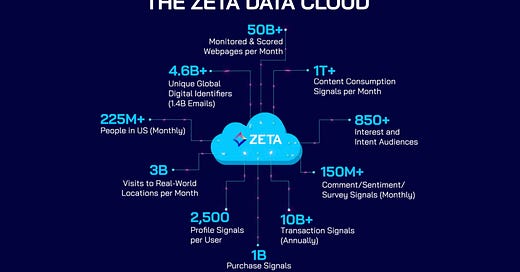Zeta Global Holdings (NYSE: ZETA — $2.11 billion) describes itself as “a leading omnichannel data-driven cloud platform that provides enterprises with consumer intelligence and marketing automation software.” In reality, Zeta is a roll-up of low-quality marketing and data gathering companies. Zeta’s products collect consumer data from far-right news sites like Breitbart and The Daily Caller and then help businesses like for-profit colleges and gambling apps aggressively market to consumers. During its delayed and downsized IPO process, Zeta was questioned by the SEC for “a lack of contemporaneous documentation and accounting analysis” and Zeta’s management has a history of failure.
Founded in 2007 by David Steinberg and former Apple CEO John Sculley, Zeta Global has grown through a dozen acquisitions into one of the largest collectors of consumer information in the world. The company highlights to investors “a patented artificial intelligence engine” that helps Zeta’s enterprise customers market effectively. In a recent interview with the TD Ameritrade Investor Network, CEO Steinberg said, “over 550 million people have opted-in to receive marketing offers from us.” Zeta’s statements to investors may be more bark than bite.
The way Zeta gathers much of its information and consumer email addresses is through Disqus, a website commenting service that was acquired by Zeta in December 2017. When millions of readers around the world leave comments on websites with Disqus they consent to Disqus’s privacy policy, which reads, in part,
“Disqus uses, and also engages third party ad partners and affiliates who use cookie IDs, device IDs (including mobile), hashed email addresses, IP address, ISP and browser information, demographic or interest data, content viewed and actions taken on the Service or Partner Sites, including information about the websites you’ve viewed and advertisements you’ve interacted within order to provide you with more relevant advertising targeted to your preferences and interests derived from your interaction with the Service, Partner Sites or other third party websites.”
Disqus will often collect email addresses of users that leave comments and then use that information “to send you newsletters and promotional emails that may interest you” according to its privacy policy:
One software blogger called Disqus “reputation suicide” and another tech blogger called Disqus “the dark commenting system” and wrote,




